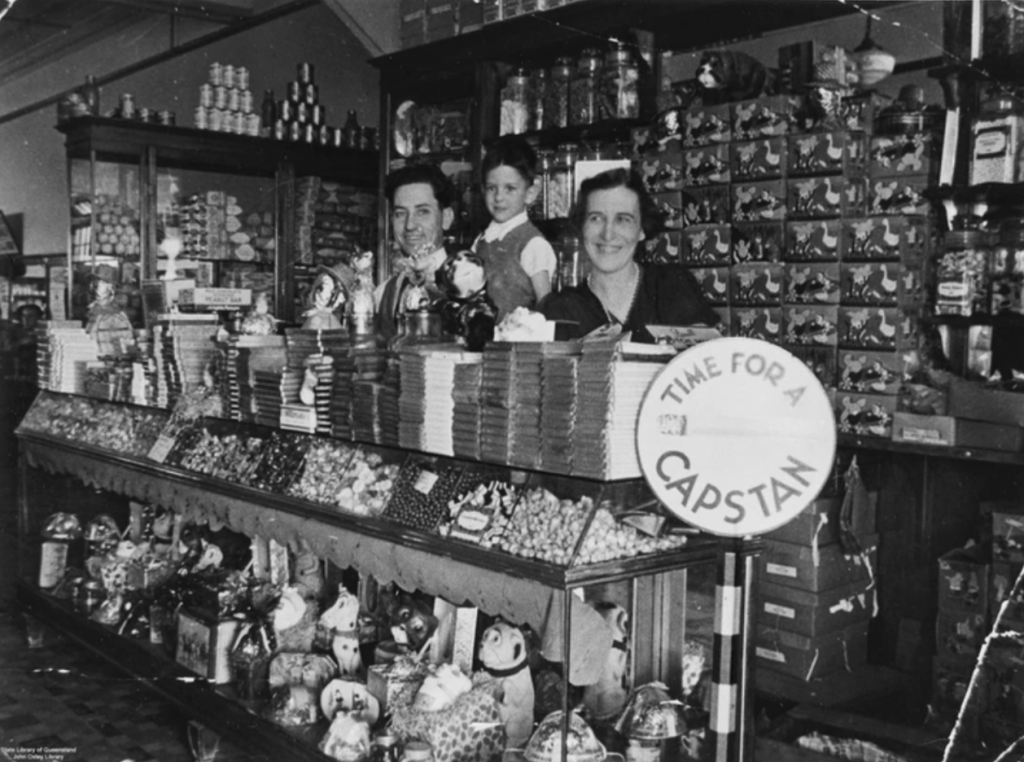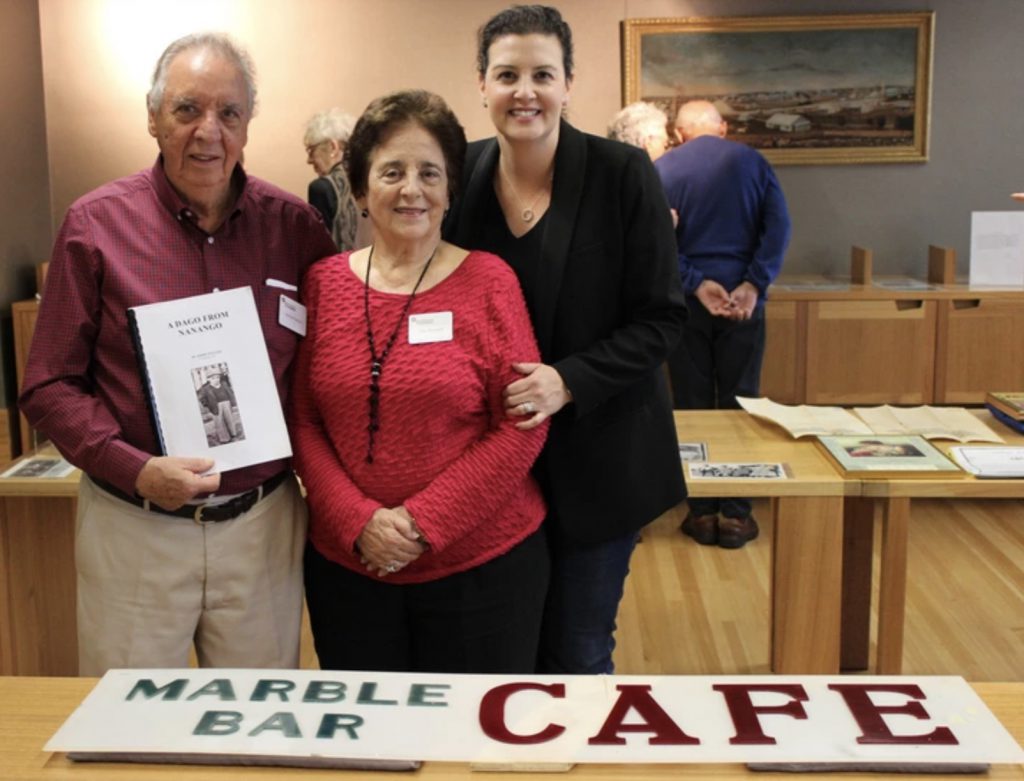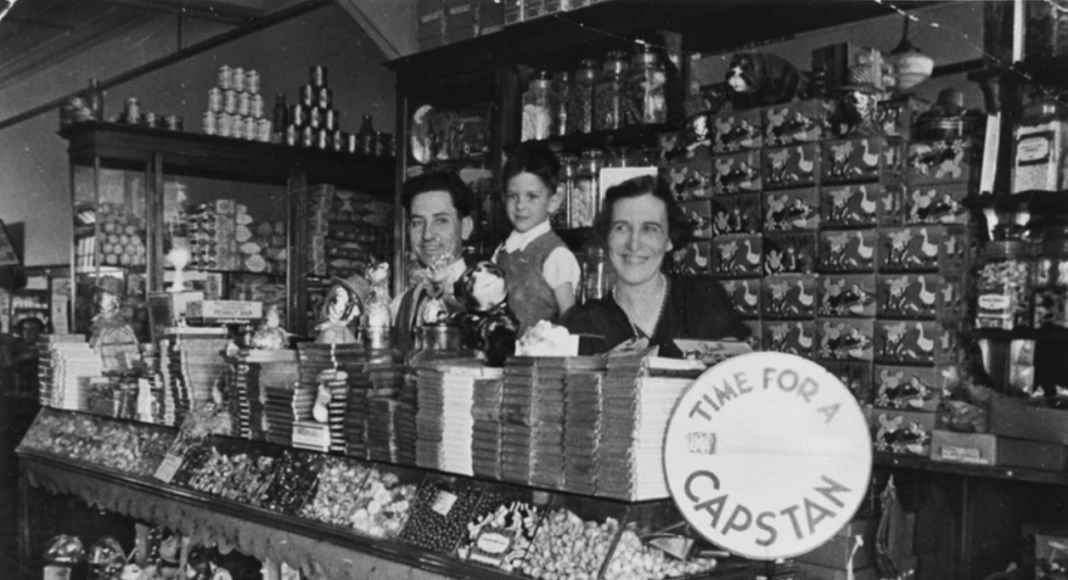Before smashed avocado and acai bowls, even before McDonald’s, there were Greek cafés. With plenty of affordable food AT ALL HOURS from a menu that was the same countrywide, the Greek café was the McDonald’s of its time.
Recognising the significance of the Greek shopkeeping phenomenon, the State Library of Queensland is curating an exhibition about the cafés migrants operated in the state’s bustling cities and in whistle-stops in the far west and tropical north. Almost every town in Queensland had a Greek café, most had multiple cafés, and up to ten operated in larger towns like Ipswich and Toowoomba during the 1930s, 1940s and 1950s. Curators Dr Toni Risson and Chrissi Theodosiou are gathering histories from Brisbane’s Greek community. They are also combing the John Oxley Library for items pertaining to Greek migration. The story of the Samios family, seen here in a photograph taken in the Paragon Café in Dalby in 1936, epitomises the café phenomenon. Meet Me at the Paragon is a free exhibition that will open 27 September 2019 and run through to 15 March 2020.

Driven from their homelands by poverty or persecution, migrants came from all over Greece to forge a new life in Australia. The success a fish shop, which Arthur Comino opened in Sydney in 1878, gave rise to a tidal wave of chain migration that saw hundreds of Greeks operating oyster saloons in the early twentieth century. From the ruins of a failing oyster industry during the 1910s rose the iconic Greek café that was, for many, the pathway to success in a new homeland. Cafés became community hubs where Australians packed into cubicles to socialise over milkshakes and banana splits, mixed grills and roast dinners, toasted sandwiches and milk coffee. As Greek proprietors adapted to market changes and food trends, their fish shops, fruit shops, ice cream parlours, sundae shops, milk bars, snack bars, confectioneries and cafés dotted the landscape for much of the twentieth century.

Driven from their homelands by poverty or persecution, migrants came from all over Greece to forge a new life in Australia. The success a fish shop, which Arthur Comino opened in Sydney in 1878, gave rise to a tidal wave of chain migration that saw hundreds of Greeks operating oyster saloons in the early twentieth century. From the ruins of a failing oyster industry during the 1910s rose the iconic Greek café that was, for many, the pathway to success in a new homeland. Cafés became community hubs where Australians packed into cubicles to socialise over milkshakes and banana splits, mixed grills and roast dinners, toasted sandwiches and milk coffee. As Greek proprietors adapted to market changes and food trends, their fish shops, fruit shops, ice cream parlours, sundae shops, milk bars, snack bars, confectioneries and cafés dotted the landscape for much of the twentieth century.
Dr Risson’s first book, Aphrodite and the Mixed Grill (2007), revealed the phenomenon that changed the way Australians ate for much of the twentieth century. A fellowship at the State Library of Queensland in 2016 unearthed the extent of that phenomenon in Brisbane. The result is Brisbane’s Greek Cafés: A Million Malted Milks, published by Teacup Books (2019). A handful of Greek migrants were trading in oyster saloons in Brisbane during the 1890s, and by the 1920s a vibrant café society flourished in the Queensland capital in the hands of more than 70 Greek proprietors. Stories about Christie’s, Bond’s Chocolates, the legendary Nick’s Café and Freeleagus Bros’ beautiful Astoria Café document a forgotten café culture. Of this new book author and journalist Trent Dalton writes, “A glorious slice of Brisbane history. A book-sized treasure chest of memory, and story”.
The early Greek migrants— stood behind their counters in the face of prejudice at every level of society. For this reason they called their shops the Regal Café or the Australia Café, or they exploited the popularity of American culture with names like the California Milk Bar or the Golden Gate. For this reason too, Greek food was never on the menu.
Paniyiri began in 1976. It’s not only Queensland’s longest running cultural festival but also the longest running Greek festival in Australia. These days, olive oil is standard supermarket fare, no longer relegated to chemist shelves, and Greek restaurants are among the most popular in Brisbane. And for two days each year in May, when more than 60,000 visitors and 1,000 volunteers converge on Musgrave Park, being Greek is the coolest thing to be.
By Toni Risson for The Greek Herald
